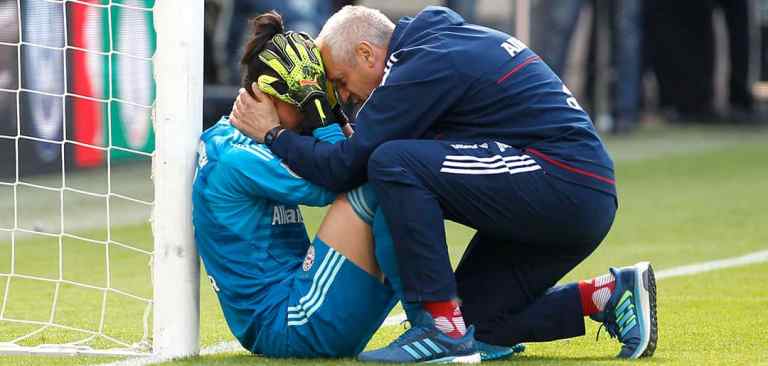Article
The Invisible Opponent: If You’re Struggling Now
Five steps we can take to pursue health on the inside
BRITTNEY JACKSON
never miss a play
Get weekly articles on sport culture, relationships, and identity.
This is part two in our series on athletes and mental health called “The Invisible Opponent.” Click “The Invisible Opponent: Breaking the Silence on Mental Health” to read part one.)
Given the high percentage and statistical evidence regarding people struggling with mental health issues, perhaps you are reading this while feeling the weight of depression, crippling anxiety, or waves of suicidal thoughts.
Know that you are not alone. There are countless people who have experienced, are currently experiencing, or will experience what you are feeling right now, and you don’t have to continue walking the path alone.
While battling mental illness, you may also feel like you are walking in a fog waiting to disappear. I want to validate this feeling, but I also think it is critical to have action steps, specific things you will do when you are struggling. Here are some suggestions I can share based on what has worked for me:
EPHESIANS 6:17
and take the helmet of salvation, and the sword of the Spirit, which is the word of God
Have a safety plan: It is very important to have a written or typed document that includes specific information on warning signs (how to know you are not doing well), coping strategies, people you can talk to and the contact information of various health professionals (therapist, psychiatrist, etc.). Of course if you are having suicidal thoughts and do not feel safe, you can always go to the nearest emergency room to be assessed and receive treatment.
Seek professional help: There are many health professionals (psychologists, counselors, psychiatrists, etc.) who are trained to deal with mental health issues. They can help you in ways friends and family may not be able to. If you see and psychiatrist, nurse practitioner or primary care doctor, they may recommend you take medication to help manage your symptoms. At first I was against taking medication because of guilt and shame, but a friend helped me understand that taking medicine for mental illness is no different than taking insulin for diabetes. God gave man the wisdom to create medicine, because he knows how our bodies work and what they need. There is no shame in taking medicine or going to therapy in order to be mentally healthy.
Be completely and fully honest with God about what you are feeling.
Stay in God’s word by reading studying, and memorizing scripture: It will not be enough to read one or two verses and expect instant change. You might need to read a particular verse or passage everyday, even multiple times a day. Now I understand that you could be so severely depressed that you may not have the cognitivity to read anything right now. If so, there is grace for that. However, Paul reminds us that the word of God is our sword in the battle against the enemy (Ephesians 6:17). Satan will use any method, including mental illness, to intrude our minds, cause us to doubt God and question our worth. This is when we need to be reminded of God’s truths and promises the most.
Pray in the midst of the pain: This may be the last thing you feel like doing. Maybe you are ashamed to be in his presence, or angry that he is allowing you to be tormented this way. Or maybe you are hurting so much that you do not know what say to him. My advice to you is this: be completely and fully honest with God about what you are feeling. Sugarcoat absolutely nothing. If you do not know what you feel, then tell him that. If you do not want to live anymore, tell him that too. He already knows all of your thoughts and feelings, talking to him takes the weight of secrecy and shame off your shoulders. You can talk to other people too, but only God knows the depths of your pain and is always ready to listen without judgment.
Let someone in: God calls us to be in community with others so we do not have to struggle alone. Find at least one person you trust who you can talk to, who will keep you accountable and that you can reach out to if you are in crisis (in danger of hurting yourself or others). This is also someone you need to be honest with, because otherwise they will not know how to help you. The first thing we want to do when battling a mental illness is isolate ourselves. Isolation is a dangerous place to be, because it is when we are most vulnerable to be attacked by the enemy. Secrets can destroy you, and you will not win this fight alone. You need the grace and mercy of God, help of people trained in this area, and the support of people who care about you.
A final thought: We cannot heal ourselves. You can do all the right things, take all the right steps and still struggle with symptoms. This does not mean you are doing something wrong or that it is your fault. You will have to trust and believe that God is in control, He is good and merciful and that these feelings will pass. It is by God’s mercy that we are healed. Whether you are an athlete, coach, athletic trainer, friend, parent, or someone else affected by mental illness, know that through the love of Jesus, there is hope no matter how dark things may seem.
If you or someone you know is struggling, particularly with thoughts of suicide, call the National Suicide Prevention Lifeline at 1-800-273-8255.
READ MORE
Where sport culture, relationships, character, identity, and faith collide.



